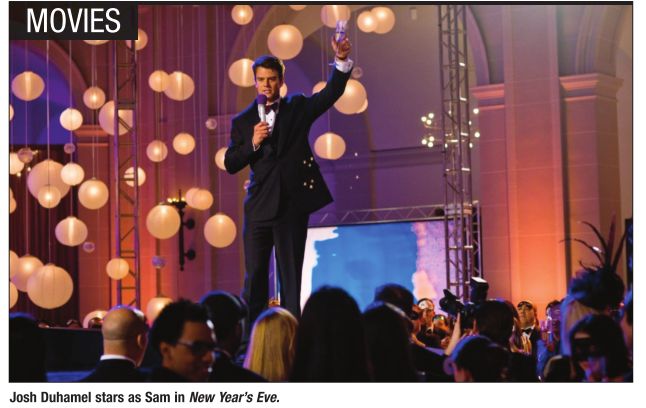
FILM | Chuck Koplinski
In 2003, director Richard Curtis pulled together an all-star cast of English actors, handed them a heartfelt script he labored over for two years and created a modern romantic classic with Love Actually. Employing multiple storylines that initially seem to have no relation to one another but eventually connect, an example of what has become known as hyperlink cinema, the film was able to overcome the main obstacle in making movies of this sort, namely keeping every one of its storylines fresh and engaging. The sharp writing and taut direction from Curtis, as well as the sincere performances from the cast, resulted in a film that still delivers a genuinely moving emotional impact even after repeated viewings. That it takes place during the Christmas season makes it all the more poignant.
Recognizing a successful formula and having no shame in ripping it off, in 2010 Warner Brothers wheeled out their own version, the wildly successful Valentine’s Day, and now New Year’s Eve. (If the studio decides to go for a trilogy, the mind boggles over the possibilities of Arbor Day.) Reflecting the American conceit that nothing exceeds like excess, the cast of the film is simply overloaded with recognizable faces, far too many to list here, and, as the press notes for the movie contend, “a multitude of Hollywood’s A-list talent.” (You have to love the publicists in Tinsel Town, as actor Til Schweiger is included here. You know, Til Schweiger, the German cinema hunk and filmmaker!?!) Truly, a scorecard is needed to keep all of these players straight.
Like 10 pounds of potatoes stuffed into a five-pound bag, this bloated movie lumbers and lurches along, never giving any of the stories or characters time to grow. As a result, the performers are relegated to playing types rather than representations of real people, so it’s kind of hard to care what happens to them. There’s the harried career-driven woman (Hilary Swank) who’s in charge of the New Year’s Eve Times Square festivities, an aging rock star (Jon Bon Jovi) who’s trying to win back the one-that-got-away (Katherine Heigl) and the girl who’s been given her big break (Lea Michel) but might be late for the show because she’s stuck in an elevator with New York City’s biggest sad sack (Ashton Kutcher). Oh, and I can’t forget the middle-age woman who has a brush with death and reevaluates her life (Michelle Pfeiffer), the bike messenger (Zac Efron) who helps her with her mini bucket list, a befuddled mom (Sarah Jessica Parker) trying to contend with her independent daughter (Abigail Breslin) and two couples (Jessica Biel and Seth Myers & Sarah Paulsen and Schweiger) who are competing to see who can deliver the first baby of the new year as $25,000 is at stake.
Yeah, my head was spinning and, with the piecemeal approach that director Garry Marshall takes to this smorgasbord of stories, yours will too. With the exception of the storyline of a terminally ill patient (Robert De Niro) and the nurse who longs to give him hope (Halle Berry), each of these plotlines comes off as trite and insincere. Much like Marshall’s Valentine’s Day, the conclusions to each of these characters’ fates is easily predicted. While this is surely a talented bunch of performers, there’s only so much you can do with a collection of clichés and one-note jokes. In the end, New Year’s Eve plays out like a party you’ve been to before, one that, in fact, wasn’t that great the first time around.
Contact Chuck Koplinski at [email protected].